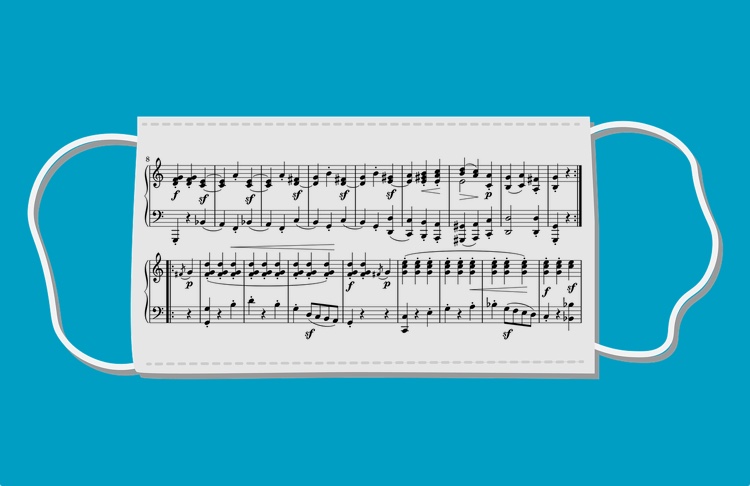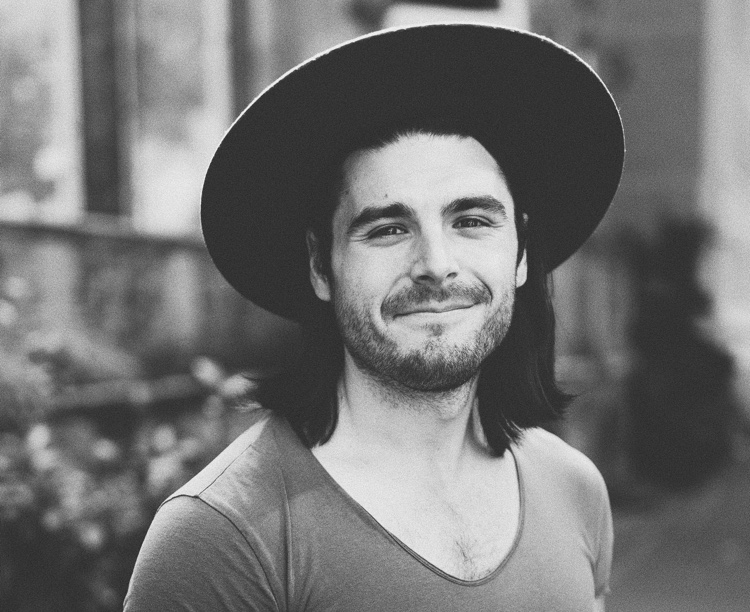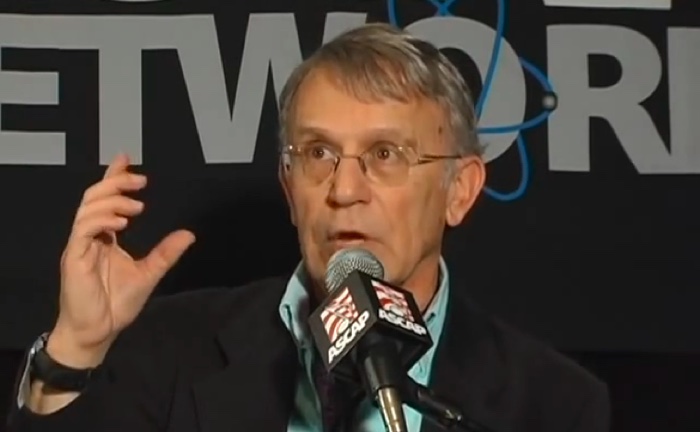
Adapted from an image by Alexey Hulsov.
How is the sync music sector adapting to life under COVID-19? We asked two leading pros in the space for their survival strategies and assessments of the situation.
The following was created with the support of Songtradr, part of a broader partnership focused on the sync licensing space.
The music industry is a diverse and complex ecosystem, and nearly every corner of this business has been affected by the COVID-19 pandemic. That includes the area of music synchronization, where marrying song with action is the name of the game. On-demand video consumption is surging — that’s the good part. But many productions are now on pause, which means schedules are frozen and critical sync music placements are getting delayed. Meanwhile, advertisers are completely realigning their approaches.
So what happens next, and more importantly, what’s the best way for dealing with right now? We asked two leading sync professionals for their on-the-ground assessment of the disruption, and strategies for dealing with it all.

Alec Stern
Alec Stern, Director of Music, DDB
As the Director of Music for the global agency DDB, Alec oversees music for the likes of Miller Lite, McDonald’s, Skittles, The U.S. Army, Coors Lite, and many others. With a background in both music supervision and composition, Alec has licensed some of the biggest songs in music history, working with the likes of Prince, Whitney Houston, John Williams, Elton John, Stevie Wonder, and The Beatles.
DMN: COVID-19 is obviously shaking up numerous music industry sectors — how is this impacting you?
Alec: I’m lucky to be healthy and working during this time, where so many are finding their lives upside down right now. During this challenging time, everyone is being impacted in some way and the music industry is definitely not being spared. I’ve gotten emails from friends who are artists, tour managers, agents, licensing representatives, and supervisors who are suddenly finding themselves out of work due to this current climate. It’s a scary time for a lot of people, and I’ve been doing my best to practice gratitude for my own situation while also doing what I can to help those in need.
As a music fan first-and-foremost, it’s obviously always been important to me to support artists — it’s why I do what I do and that will always be the most gratifying part of being a music supervisor in my book. But it’s easy to get stuck in old habits and give less thought and attention to independent recording and touring artists in favor of chasing famous songs or easier clearances. There is absolutely nothing wrong with that — everyone grinding in this incredible industry of ours is worthy of getting the work they are able to get, regardless of their size — but after all of this began, I’ve found myself really realigning and focusing on trying to work with artists directly since they arguably are the ones in the industry being hit hardest right now.
I know too many musicians whose entire year’s income went up in flames because live performances have been halted; I want to do something to help their situation. I’ve found myself really reinvigorated by finding more unknown independent talent to pitch for the projects I’m working on. Knowing that by putting an independent musician’s music in a commercial I’m working on could help offset some of the worry they are feeling right now with how they are going to survive in this current climate, it’s honestly given me a creative recharge I didn’t realize I needed. I’m finding a real sense of purpose in what I’m doing right now. It’s not saving the world by any stretch of the imagination, but if it’s helping anybody, it feels more worthwhile than ever.
DMN: How are you (and your business) adapting?
Alec: The clients I work with have all had to completely rethink their entire marketing and brand strategies during this time. Everyone seems to be aligned to the idea of wanting to do something, but what that looks like will vary from client to client, and that’s a good thing. Overall, I’ve been excited to be working on a lot of projects with real positive intention behind them, and projects that are being executed in inspiring ways.
As for me, I’m just working to remain creatively engaged and responsible during this time. I’m trying to focus my energy on the ways I can use my resources to help others. I want to help; whether it’s making connections on a personal level, to allocating a greater percentage of the songs I pitch to independent artists, I want to be able to say I used my resources to help make some small dent of a difference.
DMN: How do you see things for the industry — and sync music in particular — progressing in the short and long term as a result of all this?
Alec: I think for a while, we will see a turn away from the flashy “look at me” mentality that is always going to be a part of advertising, in favor of a quieter, more human approach. I think there is going to be a desire to tell human stories and find emotional common ground. And if done respectfully and with real tangible action to back it up, I think this is nothing but a wonderfully positive direction for things to be heading in. This is, of course, a very thin tightrope to walk for many brands, and we will see some do it more effectively than others. But my hope is that in the rush to join this larger cultural conversation, one that in one way or another does really affect everybody, brands and marketers at large will take the time to be thoughtful and meaningful in how they are communicating.
In terms of music, we’ve already seen a massive uptick in brands using extremely famous songs in their COVID responses, which I think makes a lot of sense. I think you will continue to see artists of all sizes and levels of fame wanting to get involved in some way or another, and often the way to do that is by saying yes to a sync request. That’s how something like David Bowie’s “Heroes” can wind up in a major brand spot right now — if the message is right and if the brand is seemingly doing good for communities in need during this time, I think you will see more artists or estates saying yes when maybe previously that wouldn’t have been the case. I think there is a shared responsibility and desire to help, and if brands and artists can find ways to collaboratively give back, even if it’s just making people feel good for a second with the pairing of a great song with a great message, it’s something worth doing.
DMN: Can you share a story of the community coming together to help fight this?
Alec: My faith in music, musicians, and my friends in the industry has been reaffirmed many times over in the last several weeks. I’m seeing people use their gifts as a way to bring people comfort and create connections during this time of isolation. I’ve seen GoFundMe pages for musicians who are ill, many of whom don’t have adequate health insurance. I’ve seen major music software companies, streaming services, and even local studios give products and services away for free or at heavily reduced rates to give people stuck at home something that will bring them new creative outlets.
We all came together to mourn and remember John Prine through written testimonials and achingly beautiful covers. Musicians I know personally have been holding livestreamed tutorials and Q&As about what they do, just as a way to share their knowledge and gifts with anyone interested. Fun dance and singing challenges have been started on Instagram. Virtual release parties and listening sessions have been held. Quarantine playlists have been shared. And while we’ve only just begun hearing it, I have no doubt some absolutely incredible music is being made right now all over the globe from artists we love, and many who are finding their voice for the first time right now. Some of this obviously makes a larger impact than others, but in this time of isolation, it’s been extremely heartwarming to see so much connection being made through music right now, although I would have expected nothing less.

Robert Safir
Robert Safir: Recording Professional, Library Owner, Producer, TV Composer
Robert Safir’s multi-decade music career has successfully straddled both the business and creative sides. He founded the illustrious Track Record Studios in Los Angeles, has authored numerous books for creative professionals, and was a longtime producer for a number of critically-acclaimed artists. On the sync music side, he’s composed for shows appearing on ABC Television, The Discovery Channel, E! Entertainment, The Biography Channel, BET, The Learning Channel, Spike TV, and others.
DMN: COVID-19 is obviously shaking up numerous music industry sectors — how is this impacting you?
Robert: The most obvious way is that social distancing makes working with others very difficult. Sure, working virtually over the internet is possible, but one-on-one or group sessions are not possible. Of course, the stereotype of the composer is the ‘lonely guy’ sitting at his workstation and recording track after track, and that remains true – not a lot of interaction is required. But the real impact is with opportunity. Because everything is virtually shut down, there’s not a lot of activity taking place in composing and placing music. Some of my contacts are not even in the office. Until some semblance of “normalcy” (whatever that is) resumes, I don’t expect a lot of royalties to be coming in.
DMN: How are you (and your business) adapting?
Robert: There’s nothing that I personally can do, except keep on composing. That’s how I created my own library of cues in the first place. There are way too many unknowns at this point to make deals, create goals for the future, plan ahead – and so on. We don’t know how long this situation is going to last and we don’t know how the world will look afterward. So for me, it’s back to the basics – writing, recording, producing, and listening to music – until I get a sense of either a new direction or a return to the way things were done before the pandemic.
DMN: How do you see things for the industry — and sync music in particular — progressing in the short and long term as a result of all this?
Robert: As far as adjusting to sync music licensing scenarios, I can say this. I am usually an optimist. I look for solutions whenever possible. When it comes to what’s going to happen with sync music licensing, etc., I’m becoming a little more skeptical than usual.
The reason is that production has come to a virtual standstill. Movies, television, live concerts, even bars – no music is being played. I oversee a few music libraries, and I’m concerned that a lot of music won’t be picked up if there’s nowhere to place it. Further, if production companies can license music they’ve already paid for through blanket licensing, etc., they will lean toward using those cues rather than anything new.
Out front licensing fees have been dismal for a long time. You can have a contract that states the publisher will split advances between themselves and the writer. But with the vast competition in the music business, publishers realized some time ago that they can get away with not offering sync licensing advances altogether. Obviously, there are exceptions to this – for example, A-listers like Hans Zimmer and others who can still get pretty much what they want. But the little guy? Not so much.
Let’s face it – it’s almost impossible to paint a rosy picture of the future if, in fact, we don’t even know if movie theaters are going to survive this pandemic. AMC is already considering bankruptcy. Production companies may lack new funding. And offering new movies-on-demand or for streaming is fine. But Universal Pictures, as an example, is going to charge $20 a pop for renting a newer movie. They must not be following the news. People are unemployed by the millions, many needing food and supplies. At best, even when affordable, people have to fork over $6 or $7 bucks for a rental. For Universal and others to say ‘Yes, but you can rent it before or while it’s in theaters’ is ridiculous if it’s not showing in theaters at all!
All of these issues are related. Anyone who really knows what’s going to happen is either lying or smoking too much weed. The future is as uncertain as ever. We all have to keep truckin’ and groovin’ and moving forward. The best way at a minimum is to keep writing and composing and don’t give up.
Someday, with any luck, all of this will be a distant memory.

